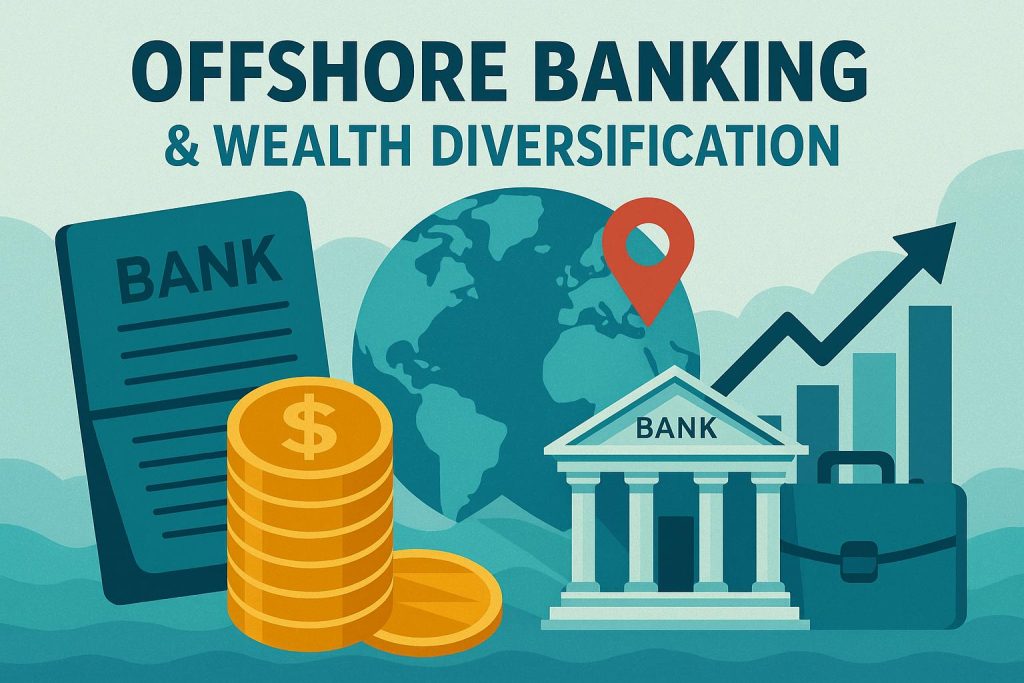Offshore Banking and Wealth Diversification

Understanding Offshore Banking
Offshore banking refers to the process of opening a bank account in a country different from one’s own. This financial practice, which is sometimes surrounded by misconceptions, offers several noteworthy advantages, such as potential tax perks, confidentiality, and asset protection. Offshore banks are typically situated in regions with advantageous financial regulations, which attract clients aiming to diversify their financial holdings on a global scale.
Benefits of Offshore Banking
Offshore banking comes with a range of benefits that cater to individual and corporate needs. These benefits include, but are not limited to:
Asset Protection: One major reason individuals and businesses opt for offshore accounts is the protection of assets. By keeping funds in jurisdictions away from their home country, they can shield their wealth from the unstable political or economic climates that might arise domestically. In case of economic downturns or political unrest, having funds in a separate legal jurisdiction can provide peace of mind and security.
Confidentiality: Another key advantage is the level of privacy and confidentiality maintained by many offshore financial centers. Although recent global initiatives have pushed for increased transparency, these jurisdictions still enforce laws and regulations that protect the identity and financial information of their clients to a significant degree. This privacy attracts clients who wish to safeguard their financial information from prying eyes.
Diversification: Offshore banking allows individuals and corporations to diversify their investments and holdings across different currencies and financial products that may not be available in their home country. This diversification can mitigate the risks linked to relying solely on domestic financial instruments.
Choosing the Right Jurisdiction
Selecting the appropriate jurisdiction for offshore banking is a crucial step. The choice of country should be influenced by several factors to ensure it aligns with the individual’s or business’s financial goals and compliance needs.
Political Stability: It’s essential to opt for a jurisdiction with a stable political environment. Political stability influences the reliability and consistency of a country’s financial system, which in turn affects the safety of deposited funds.
Regulatory Environment: Different jurisdictions have varying levels of regulatory oversight and compliance requirements. Choosing a jurisdiction with favorable regulations that align with one’s financial activities can make offshore banking more advantageous.
Reputation and Credibility: The reputability of the financial institutions within the jurisdiction is another important consideration. Jurisdictions like Switzerland, Singapore, and the Cayman Islands have built longstanding reputations for robust banking practices and reliability, making them attractive options for offshore banking.
Tax Implications
While offshore banking can present certain tax advantages, it is critical for individuals to remain compliant with global tax laws. Many countries impose regulations requiring citizens to report foreign accounts and income, with failure to comply resulting in severe penalties. Offshore accounts should not be used as a means of tax evasion, as international authorities have become increasingly stringent in enforcing tax laws and agreements between countries.
Understanding the local tax obligations within the jurisdiction where an offshore account is held is equally important. The tax implications can vary greatly from one jurisdiction to another, and staying informed of these variations helps in avoiding unexpected liabilities.
Myths and Misconceptions
Offshore banking is often clouded with misconceptions and myths, many of which stem from its portrayal in media and popular culture. A common myth is that offshore banking is primarily used for illegal activities. While it’s true that some have exploited offshore banking for fraudulent purposes, the reality is that it remains a legitimate financial strategy when used legally. Companies and individuals utilize offshore accounts for legitimate reasons, such as asset diversification, estate planning, and efficient global operations management.
Another misconception is that offshore banking is only for the ultra-wealthy. In fact, offshore banking services are accessible to a broader range of people, including small business owners and individuals seeking to enhance their financial portfolio through global diversification.
Conclusion
Offshore banking offers a compelling avenue for financial diversification and protection. While it presents several benefits, it also demands careful consideration of legal obligations and jurisdictional disparities. Potential users of offshore banking services are advised to seek guidance from qualified financial advisors. This ensures compliance with international tax laws and helps in making informed decisions regarding the most suitable jurisdiction and banking services.
Staying abreast of international financial regulations is crucial for anyone considering offshore banking. Entities such as the OECD and the IMF provide valuable resources and updates on global financial practices and regulatory standards. Engaging with such resources can facilitate a deeper understanding of the complexities associated with offshore banking, ultimately aiding individuals and businesses in leveraging offshore accounts effectively and compliantly.
This article was last updated on: August 28, 2025
